Covid-19 world updates: ‘The View’ test positive ahead of live interview with Kamala Harris
The View has pulled two of its hosts from air mid-show after they tested positive for Covid moments before the US Vice President was due to appear live.
Coronavirus
Don't miss out on the headlines from Coronavirus. Followed categories will be added to My News.
Kamala Harris has appeared remotely for a scheduled live appearance on The View after two of the show’s co-hosts tested positive for breakthrough cases of Covid-19 when the Vice President was in the studio.
The interview was delayed Friday morning after Sunny Hostin and Ana Navarro tested positive for the coronavirus, their colleague Joy Behar told the show’s viewers.
The co-hosts were vaccinated against the virus and apparently experienced “breakthrough” infections, Behar said.
Both women left the set, which was cleaned during an unplanned commercial break, she said.
Behar and co-host Sara Haines then repeatedly stalled for time by taking questions from the audience while arrangements were being made to have Harris appear remotely from a room inside the building.
“The Secret Service is doing things to make her feel safe,” Behar said.
They said Harris would do the interview remotely from within the same studio out of caution.
.@VP Harris: "Sunny [Hostin] and Ana [Navarro] are strong women and I know they're fine, but it really also does speak to the fact that they're vaccinated and vaccines really make all the difference because otherwise we would be concerned about hospitalization and worse." pic.twitter.com/m5NMwT5dk8
— The View (@TheView) September 24, 2021
.@VP@KamalaHarris on Afghanistan pull-out: “The president has been clear, and I think the American public agree[s] that it was time to end that 20-year war.â€
— The View (@TheView) September 24, 2021
“We are a global leader... we have to stay focused on those interests wherever they take place.†https://t.co/w3c681Prf2pic.twitter.com/9Xmn2tobj6
The EU’s medicine watchdog said on Thursday it expects to decide in early October whether to approve boosters of the Pfizer/BioNTech coronavirus vaccine for all people aged over 16.
A decision on further doses of both the Pfizer and Moderna vaccines for at-risk people and the elderly is due at the same time, the European Medicines Agency (EMA) said.
Protection against the disease is shown to decrease in the months following the first jabs, the Amsterdam-based regulator’s head of vaccine strategy Marco Cavaleri told a news conference.
“The available data are showing that immunity against Covid-19 from initial vaccination wanes over time, and the protection from infection and symptomatic disease is decreasing in different parts of the world,” Cavaleri said.
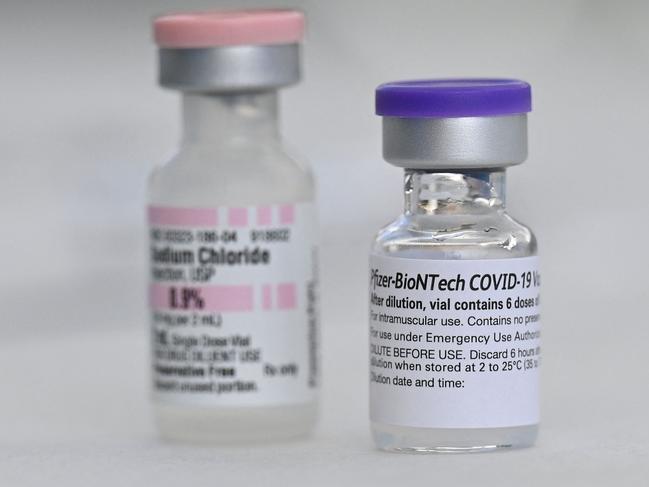
As a result, the EMA is now evaluating Pfizer’s application for the use of a third booster dose at least six months after the second dose in people aged 16 or older.
“The outcome of this evaluation is expected in early October unless supplementary information is needed,” Cavaleri said.
The EMA expert also said the “evidence was becoming clearer” on the need for boosters shortly after the first jabs for people with weakened immune systems who “respond poorly” to the initial vaccination.
The watchdog would “consider by early October if any specific recommendation can be included in product information” for the Moderna and Pfizer vaccines for such people, Cavaleri said.
“It is acknowledged and understood that some member states are already rolling out additional doses for these people,” he said.
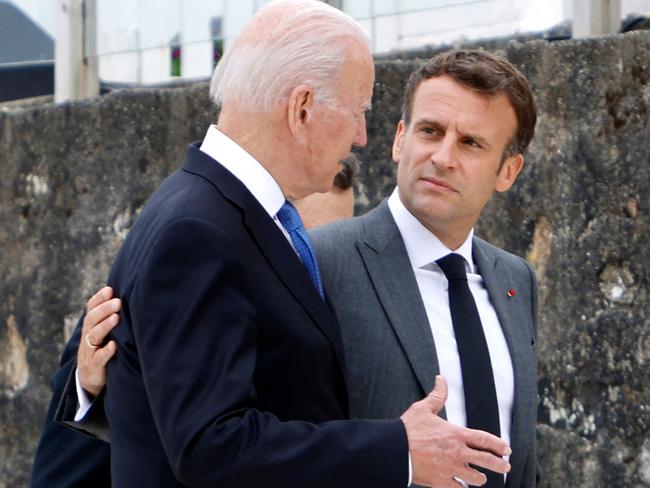
MACRON TO EMERGE AS EU’S MOST POWERFUL COVID-ERA LEADER
French President Emmanuel Macron will emerge as the EU’s most powerful leader when Angela Merkel steps down but German coalition building may stall his EU ambitions, analysts say.
It could take months of coalition talks before Ms Merkel’s successor takes over as chancellor – a tense period during which they will not be available for numerous major EU initiatives.
This is especially inopportune for Mr Macron as France takes over the rotating six-month EU presidency at the start of next year and as he himself enters the final stretch of his battle to get re-elected.
France is likely to want progress on EU defence co-operation in the wake of the spat with Australia, Britain and the United States sparked by a lost submarines contract.
Mr Macron is also expected to seek a fresh program to get the bloc’s economies on their feet again post-Covid, and some initiatives on migration – topics that require weighty German support.
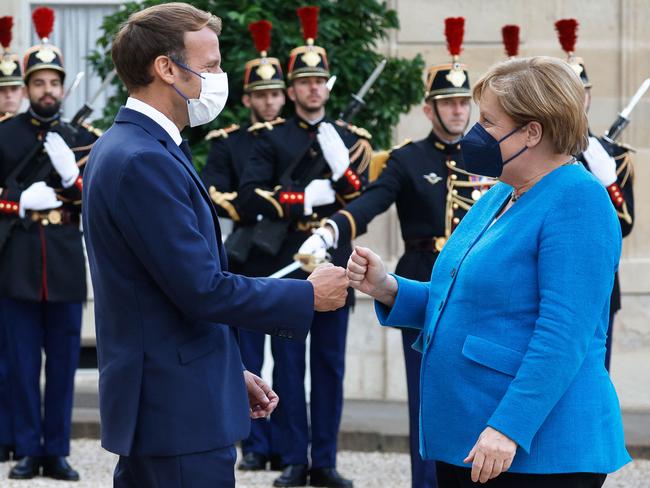
“There probably won’t be a German team ready for action” when France takes the EU helm on 1 January, Francois Heisbourg, special Adviser at the FRS strategic research foundation, told AFP.
France will also have to factor in the reality that after 16 years of Merkel, her boots are too big to be filled by any successor.
“It is clear that the next chancellor will not have the same weight on the European and international scene as Merkel has today,” said Alexandre Robinet-Borgomano, head of the Germany program at the Institut Montaigne think tank.
“This could become a problem for the French president, once the immediate joy at becoming the stronger partner in the French-German couple has faded,” he said.
BIOTECH BILLIONAIRE TO MAKE ‘GAME CHANGER’ VACCINES IN SOUTH AFRICA
Biotech billionaire Patrick Soon-Shiong on Thursday, local time, said he will begin transferring technology to make Covid-19 and cancer vaccines in South Africa.
The South African-born and now United States-based doctor provided details of the plan that will see coronavirus vaccine production starting next year in an online press conference with President Cyril Ramaphosa.
Soon-Shiong’s company NantWorks will transfer the technology within the next three months and vaccine production is expected to begin in 2022.
The government’s Council for Scientific and Industrial Research, the South African Medical Research Council and the Centre for Epidemic Response and Innovation, as well as four local universities, according to a statement from Ramaphosa’s office.
In addition to the vaccines, the NantWorks initiative will work on cell-based immunotherapies that could lead to new cancer treatments.
The California-based physician Soon-Shiong said this is “a historic moment in my life, it’s been a life dream to look at technologies we can bring back home”.
“We are now set with the knowledge, technology to manufacture vaccines in Africa,” he said. “It is my goal and hope that Africa will benefit from this technology.”
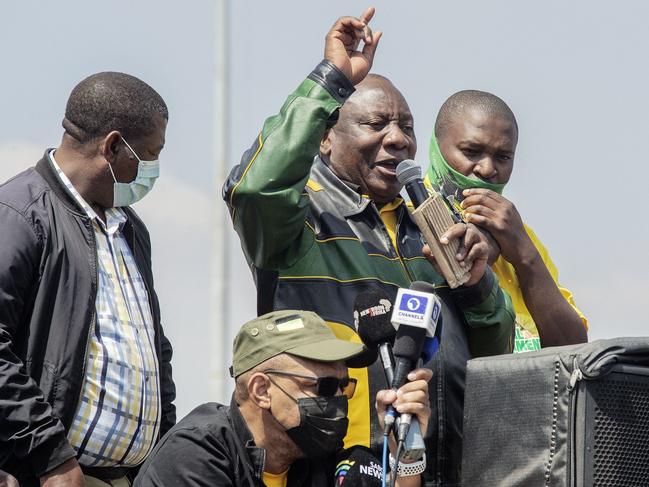
Mr Ramaphosa described the investment, as “a game-changer” for South Africa.
“This collaboration will place South Africa, and Africa as a whole at the cutting edge of healthcare, science, technology and innovation,” said Ramaphosa In Africa “we have been bemoaning that we have not been fully prepared for this pandemic, … now this is going to make us to be ahead of the curve”, he said.
Soon-Shiong made his fortune from the success of a cancer drug that he invented. His widely varied business interests include owning the Los Angeles Times as well as a stake in the Los Angeles Lakers basketball team.
The World Health Organisation has selected South Africa to host an mRNA manufacturing hub with Cape Town-based Biovac to complete the last step “fill and finish” for the Pfizer/BioNTech vaccine.
AUSTRALIA PLEDGES 40M DOSES TO INDO-PACIFIC REGION
Scott Morrison told global leaders on Wednesday that Australia will donate another 40 million vaccine doses to our Indo-Pacific neighbours over the next 15 months.
The pledge at a virtual summit on the global coronavirus pandemic hosted by US President Joe Biden in Washington, DC, represents a tripling of Australia’s vaccine commitment in the region, to 60 million doses before the end of 2022.
“We will do our part in ending this pandemic,” Mr Morrison said.
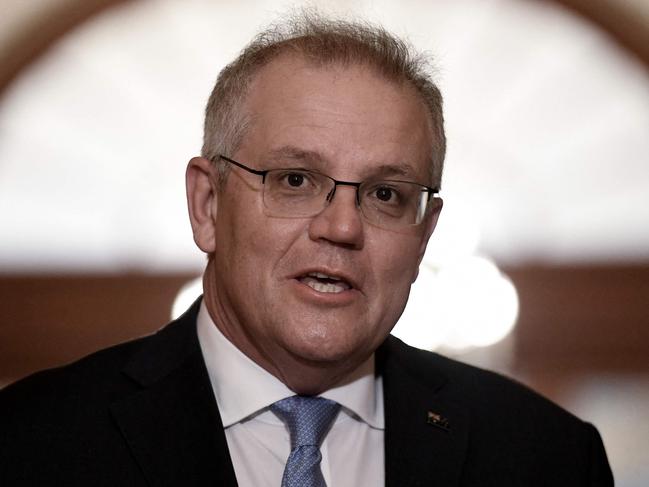
“We’re also looking to the next phase of recovery: supporting research and development, and genomic surveillance; strengthening our global health system to better respond to future threats; working through multilateral processes to mobilise political commitment and resourcing, and to reform global health architecture.”
In a veiled swipe at China, the PM said Australian commitments come with “no strings attached.”
Australia so far has delivered more than 3.2 million vaccine doses of the 20 million promised to the region in June.
The Morrison government has committed to giving $623.2 million to help Indo-Pacific nations access vaccines, as well as donating 4000 ventilators, almost 2,000 oxygen concentrators, and 106 tonnes of PPE, medical equipment and supplies.
US DOUBLES GLOBAL DONATION OF COVID-19 VACCINE DOSES
The United States is set to increase the amount of Covid-19 vaccines donated to other countries in bid to combat the pandemic worldwide, the White House announced Wednesday.
Speaking at the virtual Covid-19 summit on the margins of the UN General Assembly, Joe Biden announced that the US is purchasing an additional 500 million Pfizer Covid-19 vaccines to donate to low income countries around the world.
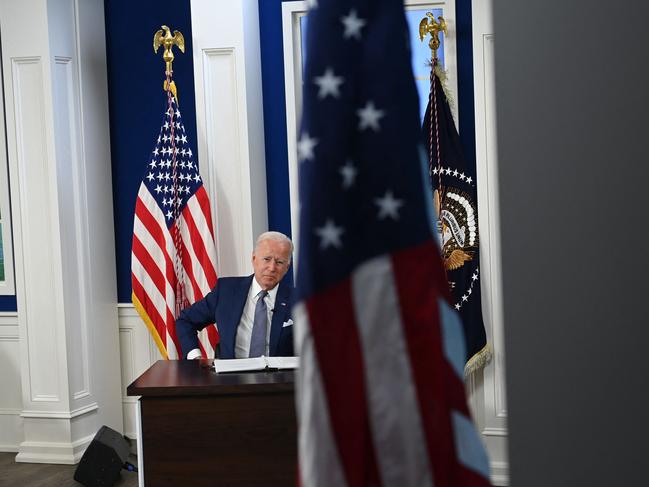
The newly announced 500 million doses are on top of the 500 million the US had already committed to sharing with other nations, bringing the US total of its global vaccination commitment to more than 1.1 billion doses through 2022. About 160 million shots supplied by the US have already been distributed to more than 100 countries, representing more donations than the rest of the world combined. The remaining American doses will be distributed other the coming year.
“To beat the pandemic here, we need to beat it everywhere,” Biden said.
“For every one shot we’ve administered to date in America, we have now committed to do three shots to the rest of the world.”
The latest purchase reflects only a fraction of what will be necessary to meet a goal of vaccinating 70 per cent of the global population — and 70 per cent of the citizens of each nation — by next September’s United Nations meeting.
It’s a target pushed by global aid groups that Biden threw his weight behind.
As we fight COVID-19 here at home, we need to continue our efforts overseas. That’s why today, I announced we’re increasing our total vaccine donation to over 1.1 billion doses — more than every other country combined.
— President Biden (@POTUS) September 22, 2021
That’s American leadership on the global stage.
‘BOMBS AND BULLETS WON’T STOP COVID’
On Tuesday, Biden declared that “bombs and bullets cannot defend against Covid-19 or its future variants” during his first speech to the United Nations General Assembly in New York.
“Indeed, today many of our greatest concerns cannot be solved or even addressed through the force of arms. Bombs and bullets cannot defend against Covid-19 or its future variants,” the president said during his address.
“To fight this pandemic, we need a collective act of science and political will. We need to get shots in arms as fast as possible and expand access to oxygen, tests, treatments to save lives around the world.”
He also touted American vaccine sharing efforts, saying they’d provided a “little dose of hope” in communities around the world.
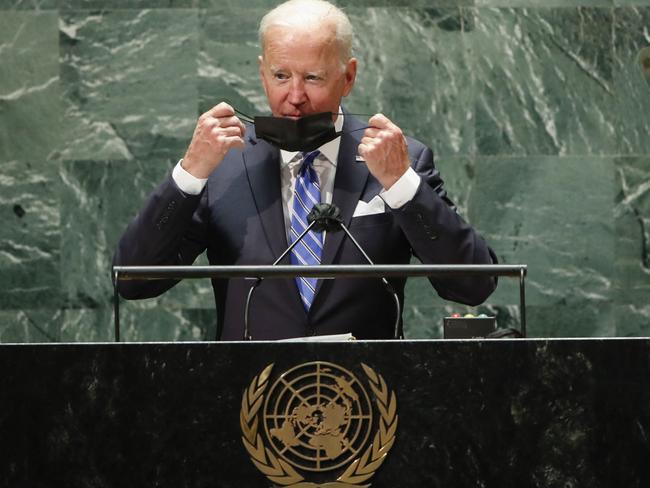
According to the president, the US has contributed more than $15 billion toward global Covid-19 response, shipping “more than 160 million doses of Covid-19 vaccine to other countries.”
“This includes 130 million doses from our own supply and the first tranches of a half a billion doses of Pfizer vaccine we purchased to donate through COVAX,” he said.
Mr Biden told the UN that he will announce additional commitments from the US at the global Covid-19 summit on Wednesday local time to “advance the fight against Covid-19 and hold ourselves accountable around specific targets on three key challenges — saving lives now, vaccinating the world, and building back better”.
BALI TRAVEL TO RESUME
Indonesia is set to reopen Bali to overseas tourists next month – but Australians are set to miss out.
Only travellers from countries with low Covid infection numbers are being considered for entry into the popular holiday spot including Singapore and New Zealand.
Luhut Pandjaitan, the co-ordinating Minister for Maritime and Investment Affair, said he was “very confident” Bali could be reopened next month based on current daily Covid case trends.
“We are happy today that the reproduction rate is below 1 … It is the lowest during the pandemic and is indicating the pandemic is under control,” Mr Luhut told a news conference.
“With the trend today, we are very confident that Bali can reopen by October and we are preparing it right now so Bali can receive tourists.”
International arrivals into Indonesia have to quarantine for eight days. But that could be lowered to five days in October, he said.
US ENDS TRAVEL RESTRICTIONS FOR VACCINATED
The United States announced Monday local time it will lift Covid travel bans on all air passengers in November if they are fully vaccinated and undergo testing and contact tracing.
The unprecedented restrictions had kept relatives, friends and business people around the world separated for many months as the pandemic grinds on.
Jeffrey Zients, coronavirus response co-ordinator for President Joe Biden, told reporters the new “consistent approach” would take effect “early November.”
The easing of travel restrictions, imposed by Donald Trump 18 months ago as the Covid-19 pandemic first erupted, marks a significant shift by Biden and answers a major demand from European allies at a time of strained diplomatic relations.
Numerous safeguards will remain in place to suppress spread of the virus, which has already killed more than 670,000 Americans and is resurgent after what many had hoped was a lasting dip earlier this year.
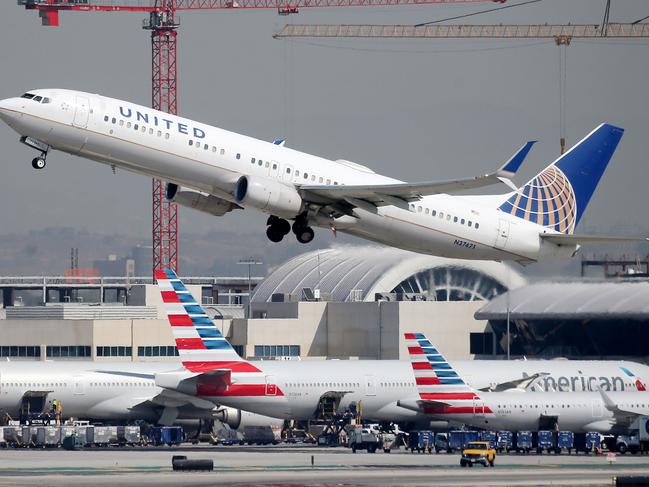
“Most importantly, foreign nationals flying to the US will be required to be fully vaccinated,” Zients said.
It wasn’t immediately clear if the new rule only applied to US-approved vaccines or if other brands, such as those produced in China or Russia would also qualify. Zients said that would be determined by the US Centers for Disease Control.
Zients said passengers will need to show they were fully vaccinated before boarding planes to the United States, as well as providing proof of a negative Covid-19 test taken within three days.
Americans not fully vaccinated will still be able to enter but only on testing negative within a day of travel.
Masks will be obligatory on US-bound flights and airlines will provide the US health authorities with contact tracing information.
“This new international travel system follows the science to keep Americans’ international air travel safe,” Zients said.
PFIZER ‘SAFE FOR KIDS AGED 5-11’
Pfizer announced that its Covid vaccine works for kids ages 5 to 11 and that it will seek US authorisation for this age group soon — a key step toward beginning vaccinations for young children.
The vaccine made by Pfizer and its German partner BioNTech already is available for anyone 12 and older. But with children now back in school in the United States and the highly-contagious Delta variant causing a huge jump in paediatric infections, many parents are anxiously awaiting vaccinations for their younger kids, New York Post reports.
For primary school-aged kids in the US, Pfizer tested a much lower dose — a third of the amount that’s in each shot given now. Yet after their second dose, children ages 5 to 11 developed coronavirus-fighting antibody levels just as strong as teenagers and young adults, Dr. Bill Gruber, a Pfizer senior vice president, said.
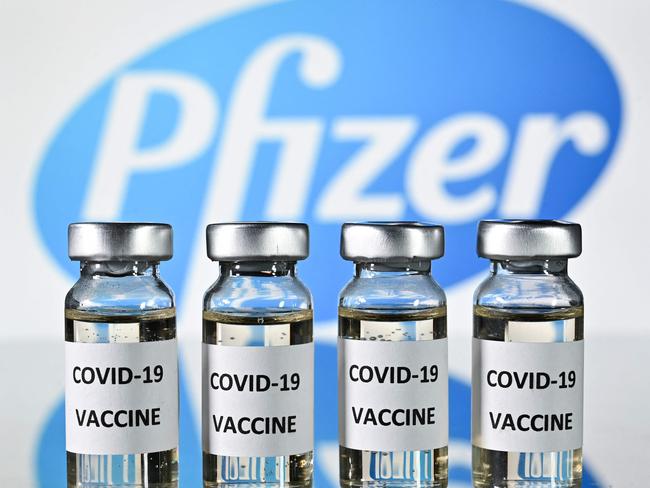
The dosage also proved safe, with similar or fewer temporary side effects — such as sore arms, fever or achiness — that teens experience, he said.
“I think we really hit the sweet spot,” said Gruber, who’s also a paediatrician.
Gruber said the companies aim to apply to the Food and Drug Administration by the end of the month for emergency use in this age group, followed shortly afterwards with applications to European and British regulators.
Earlier this month, FDA chief Dr. Peter Marks told the AP that once Pfizer turns over its study results, his agency would evaluate the data “hopefully in a matter of weeks” to decide if the shots are safe and effective enough for younger kids.
COVID’S GLOBAL TOLL REVEALED
Coronavirus has killed at least 4.6 million people globally since the outbreak emerged in China in December 2019, according to new analysis.
At least 228,494,810 cases of coronavirus have been registered. The vast majority have recovered, though some have continued to experience symptoms weeks or even months later.
The figures are based on daily reports provided by health authorities in each country.
They exclude revisions made by other statistical organisations, which show that the number of deaths is much higher.
The World Health Organisation estimates that the pandemic’s overall toll could be two to three times higher than official records, due to the excess mortality that is directly and indirectly linked to Covid-19.
A large number of the less severe or asymptomatic cases also remain undetected, despite intensified testing in many countries.
On Sunday, 5,440 new deaths and 363,125 new cases were recorded worldwide. Based on latest reports, the countries with the most new deaths were Russia with 778 new deaths, followed by Malaysia with 376 and Iran with 344.
The United States is the worst-affected country with 673,765 deaths from 42,087,485 cases.
‘YOU DON’T WANT THIS’: CHRIS ROCK TESTS POSITIVE
Chris Rock is urging his fans to get the Covid jab after testing positive to the virus.
The US comedian announced the news on Twitter: “Hey guys I just found out I have Covid, trust me you don’t want this. Get vaccinated,” Rock tweeted.
The actor has previously stated he received the Johnson & Johnson jab. “I’m two-shots Rock, that’s what they call me,” the actor said during an interview on The Tonight Show with Jimmy Fallon in May, before naming the J & J vaccine.
“That’s the food stamps of vaccines,” Rock said.
Fans flooded the comic’s profile to wish him well in his recovery: “Wishing you a speedy recovery Chris Rock … thank you for advocating getting vaccinated,” wrote one supporter.
Another wrote: “Chris got vaccinated back in May and was vocal about it. Praying for his quick healing so he can be a sharp voice of reason and wit again.”
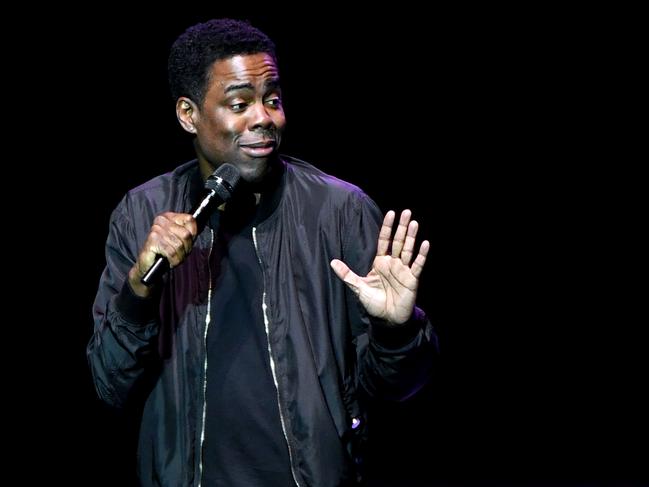
TRUMP MAKES SHOCKING CLAIM ABOUT FAUCI
Donald Trump claims his former medical adviser Anthony Fauci did not discuss the Wuhan Institute of Virology’s research his agency funded during Oval Office meetings.
The former US president said he would grade Fauci “D” as a doctor and said it was “ridiculous” he funded coronavirus research in the lab he believes the virus originated from.
“They were even making payments for certain kinds of research. Certain payments and I ended that, I stopped that when we found out about that,” Mr Trump says in a Sky News documentary to air Monday night, according to The Australian.
“He (Fauci) was doing that during the Obama years and when I found out about it, I said: ‘Can you imagine that the United States is making payments to a Chinese lab?’ Just that on its face didn’t make sense, but I stopped that.
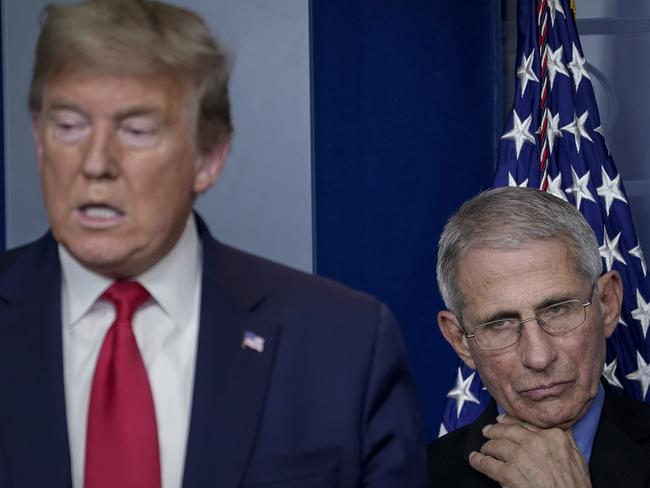
“It sounded so ridiculous to me that we were giving money to China and especially when I heard it was going to the lab, and we ended it quickly.
Mr Trump said Dr Fauci never once told him the Wuhan Institute of Virology was genetically manipulating coronaviruses.
“Well, no he didn’t,” Mr Trump said. “Anthony’s been in government for many, many years, is a bureaucratic kind of a guy, a very great promoter. I give him an A-plus as a promoter and probably a C or a D as a doctor or a scientist.”
Dr Fauci has said he funded coronavirus research in China to avoid an outbreak in the US.




